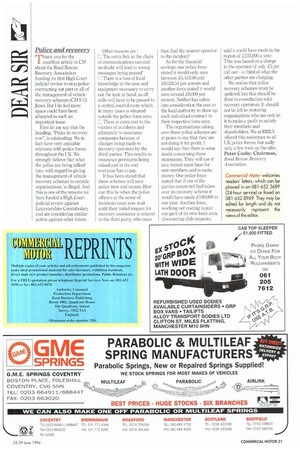Police and recovery T hank you for the excellent article in
Page 23

If you've noticed an error in this article please click here to report it so we can fix it.
CM about the Road Rescue Recovery Association funding its fu-st High Court judicial review to stop police contracting out part or all of the management of vehicle recovery schemes (CM9-15 June). But I do feel more space could have been allocated to such an important issue.
First let me say that the heading, "Police in recovery row", is misleading. We in fact have very amicable relations with police forces throughout the UK. We strongly believe that what the police are being talked into, with regard to giving the management of vehicle recovery schemes to outside organisations, is illegal. And this is one of the reasons we have funded a High Court judicial review against Leicestershire Constabulary and are considering similar action against other forces. Other reasons are : E The extra link in the chain of communications can and no doubt will lead to wrong messages being passed' fl There is a loss of local knowledge in the area and equipment necessary to carry out the task at hand, as all calls will have to be passed to a central control room which in many cases is situated outside the police force area; C There is extra cost to the victims of accidents and ultimately to insurance companies because of charges being made to recovery operators by the third parties. This results in insurance premiums being raised and in the end everyone has to pay.
It has been stated that these schemes will save police time and money. How can this be when the police officers at the scene of incidents must now wait until their initial request for recovery assistance is relayed to the third party. who must then find the nearest operator to the incident?
As for the financial savings, one police force stated it would only save between £5,443.98 and £6,024.54 per annum and another force stated it would save around £8,000 per annum. Neither has taken into consideration the cost to the local authority to draw up each individual contract in their respective force area.
The organisations taking over these police schemes are at pains to say that they are not doing it for profit. I would say that there is some doubt concerning these statements. They will use it as a recruit-ment base for new members and to make money. One police force stated that if one of the parties concerned had taken over its recovery scheme it would have made £100,000 in one year. Another force, working out costing in just one part of its own force area, discounting club requests, said it could have made in the region of £125,000 a year. This was based on a charge to the operator of only £5 per call out—a third of what the other parties are charging.
We realise that police recovery schemes must be updated, but this should be done in consultation with recovery operators. It should not be left to motoring organisations who are only in it to make a profit to satisfy their members and shareholders. We at RRIZA offered this assistance to all UK police forces, but sadly only a few took up the offer. Peter Cosby, Chairman, Road Rescue Recovery Association.
Commercial Motor welcomes readers' letters, which can be phoned in on 081-652 3689 (24-hour service) or faxed on 081-652 8969. They may be edited for length and do not necessarily represent the views cif the editor.
















































































































